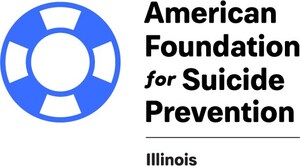WASHINGTON, Sept. 10, 2020 /PRNewswire/ -- On World Suicide Prevention Day, the American Foundation for Suicide Prevention (AFSP) and the American College of Emergency Physicians (ACEP) join in honoring the founders of two suicide prevention programs. This year's winners of the Innovation in Acute Care Suicide Prevention Award are Emmy Betz, MD, MPH, FACEP, on behalf of the team behind "Lock to Live," and Stephen Anderson, MD, FACEP, on behalf of the City of Auburn, Washington, and Mayor Nancy Backus for their creation of the R.E.A.D.Y program. These awards were presented today during a virtual ceremony as part of the Allies in Action Awards from the American Foundation for Suicide Prevention.
"We are excited to recognize Dr. Betz, Dr. Anderson and Mayor Backus for their innovation and ground-breaking efforts to prevent suicide. When we began work on Project 2025, we hoped it would lead to creative new solutions like those developed by the award winners. These awardees are true lifesavers in the fight to stop suicide," said Robert Gebbia, AFSP CEO.
This year's winners of the Innovation in Acute Care Suicide Prevention Award are:
- Dr. Emmy Betz, on behalf of the team behind "Lock to Live," an innovative, patient-centered online tool that augments provider-delivered counseling. The tool helps suicidal adults and their families think through decisions about the storage of firearms, medications, and other potentially harmful items. It then guides a person through questions about storage factors and personal preferences. The process of developing and testing the innovative "Lock to Live" tool contributed to the science and practice of lethal means safety for suicide prevention and the field of decision science. Limiting access to lethal means when someone is in distress can save lives, making this a key tool for suicide prevention.
- Dr. Stephen Anderson, on behalf of the City of Auburn, Washington and Mayor Nancy Backus, for their creation of the R.E.A.D.Y program. In 2015, a King County Community Health Needs Assessment showed parts of south King County, including Auburn, as the most negatively impacted areas in the state for health, housing, and economic opportunity measures. The R.E.A.D.Y. program can be customized for any community and provides information about common mental/behavioral health issues, and basic tools to use in emergent situations. The program bridges the gap until 911 responds and prepares participants for what to expect when they arrive at the emergency department. The R.E.A.D.Y. program has been seen by over 3,000 citizens/organizations in King County and across Washington state.
"As outstanding members of ACEP, the emergency medicine community applauds Drs. Betz and Anderson for their leadership in suicide prevention," said William Jaquis, MD, FACEP, president of ACEP. "Initiatives like these show the value of having emergency physicians at the center of collaborative approaches to suicide prevention and public health. Localized and personalized programs like these continue to expand the vital role of emergency medicine and provide real lifesaving benefits to people in communities across the country."
AFSP's Allies in Action Awards Event seeks to honor individuals who are working tirelessly at all levels of government to improve mental health and reduce suicide in our country. This award is in recognition of their longstanding and steadfast support of, and leadership in, suicide prevention and mental health.
The online awards ceremony held today included volunteers who have lost loved ones to suicide or who have their own lived experience with a suicide attempt, along with mental health professionals, suicide prevention allies, members of Congress and their staff, and other leaders in the field. The ceremony coincides with a campaign AFSP is championing for National Suicide Prevention Week (September 6-12), the #KeepGoing campaign. To learn about the other award winners, visit: afsp.org/2020alliesinaction.
More about Project 2025 - Using a dynamic systems model approach based on what the evidence tells us about suicide, AFSP has determined a series of actions and critical areas to help reach this unprecedented goal. With this approach, the organization will reach across all demographic and sociological groups to have the greatest impact for suicide prevention, and the potential to save thousands of lives by the year 2025. From the model built for Project 2025, AFSP shares examples of how many lives could be saved at a national level if scaled up and made strategic investments, while applying the collective resources necessary to support these prevention areas. The model has revealed four areas for critical action including: (1) firearms and suicide prevention, (2) healthcare systems, (3) emergency departments, and (4) corrections system.
The American College of Emergency Physicians (ACEP) is the national medical society representing emergency medicine. Through continuing education, research, public education and advocacy, ACEP advances emergency care on behalf of its 40,000 emergency physician members, and the more than 150 million Americans they treat on an annual basis. For more information, visit www.acep.org and www.emergencyphysicians.org.
The American Foundation for Suicide Prevention is dedicated to saving lives and bringing hope to those affected by suicide. AFSP creates a culture that's smart about mental health through education and community programs, develops suicide prevention through research and advocacy, and provides support for those affected by suicide. Led by CEO Robert Gebbia and headquartered in New York, and with a public policy office in Washington, D.C., AFSP has local chapters in all 50 states with programs and events nationwide. Learn more about AFSP in its latest Annual Report, and join the conversation on suicide prevention by following AFSP on Facebook, Twitter, Instagram, and YouTube.
SOURCE American Foundation for Suicide Prevention

Related Links
WANT YOUR COMPANY'S NEWS FEATURED ON PRNEWSWIRE.COM?
Newsrooms &
Influencers
Digital Media
Outlets
Journalists
Opted In





Share this article